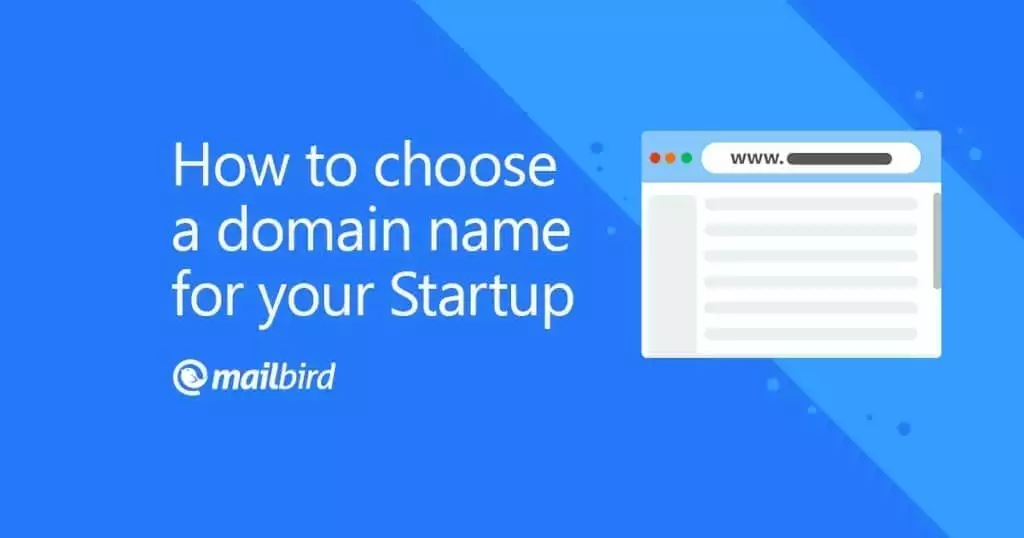How to Choose a Domain Name for Your Startup

Sticky. Memorable. Simple. These are all words to describe a good domain name for your startup. It may seem like a small, somewhat insignificant detail in the grand scheme of all the things you need to do for your startup. But your domain name should not be overlooked.
If you've already chosen a name for your startup, you'll have a leg up on those who have not. Your business name will be the biggest factor in choosing your domain name since your domain name is essentially the front door to your startup. It's how people will "enter" your website. It's the URL that people will search or type into their browser to find you. And it's not something to be taken lightly.
At the same time, it's also not as simple as just turning your business name into a URL. If that were the case, Airbnb might still have the URL AirBedAndBreakfast.com. Much more difficult to remember than Airbnb.com!
As you're brainstorming the domain name for your startup, there are certain principles you should follow to make your domain name smart and effective. Stick to these guidelines for a domain name that is sticky, memorable and simple.
1. Tie it to your brand
This point may be somewhat contradictory to what was just said, but let me explain. Your domain name should absolutely be a reflection of the name of your startup. It just doesn't have to be the entire name, especially if it's longer than two words.
What your domain name should be is tied to your brand. You should be able to easily make a connection between your business name and your URL. For some, like Uber or Dropbox, it's easy—Uber.com and Dropbox.com. For others, it may not be as simple, especially because you won't have the enormous brand recognition that these companies capture. You should avoid any drastic changes from your business name to your domain name to ensure people can clearly identify you. Acronyms or shortened words that don't really make sense are not recommended. (For example, shortening "technologies" to "tech" or "company" to "co" is logical. Shortening "logistics" to "log" or "advisors" to "adv" wouldn't be easily recognizable.)
2. Keep it short and simple
These two recommendations can also be somewhat contradictory because making domain names shorter can sometimes make them more complicated. You want to keep it short, but not so short that it becomes unrecognizable. For example, what if your company was the fictional Stark Industries from the Marvel universe? Which domain would be better: StarkIndustries.com or StarkInd.com? While the second one is shorter, the first one is more clear and easier to understand—we would prefer the first option.
The same rule goes for acronyms. While it works for big brands—did you know that "CVS" stands for "Consumer Value Stores?"—it will only work for you if your startup or product is regularly referenced by that acronym. Use your best judgment when deciding whether an acronym would help or confuse your customers.
As simple as email can get.
3. Make it unique
When choosing both a business name and a domain name, one of the first things you should verify that the name you chose does not violate any trademarks. Once you've done that, you'll always want to make sure no one else out there is using the same name, or something close to it. Do a quick Google search. Does anything come up for the domain you want? Or—even further—does anything similar or close to what you want to pop up? You want to make your domain as distinct as possible to avoid confusion. A unique domain name will make it easier for customers to find you, and it won't confuse people looking for someone else and finding you instead.
Side Note: If your domain name is too similar to another company, this can be hugely detrimental to any Search Engine Optimization (SEO) efforts you may be engaging in. When people click on your page in search results and leave immediately, search engines view this as a sign that your content is not delivering on what that person searched for. In turn, your site is ranked lower in results. If your domain name is too similar to another company's, people will be clicking on your site and leaving immediately when they realize your page is not what they were looking for. Bottom line: Use a unique enough domain name that people who are searching for you find you and not another company by accident.
4. Choose a sensible extension
You may have noticed an onslaught of URLs with different extensions outside of the typical ".com," ".org," and ".net." There's anything from ".agency" to ".news" to ".tech" to ".photography." While this may seem like a fun way to make your domain name unique, it's not necessarily the best idea. This is a relatively new trend that might not be sticky in consumers' minds unless they can draw some sort of connection between the extension and your startup name. For example, if your company was named "Palmer Technologies" (another fictional TV company from DC's show "Arrow"), you could probably get away with "Palmer.tech."
Most of the time, you'll want to go with ".com." If for some reason you cannot get the ".com" version of the name you want, you might want to consider ".co" or ".net" before branching out into the fancy new domain extensions.
Conclusion
By now, you've probably realized that choosing a domain name for your startup isn't as simple as you thought it might be. We've given you a lot to consider. If you remember anything from this advice, it should be this: Sticky. Memorable. Simple. Those are the most important qualities of a domain name. (And maybe that it's not a registered trademark. You don't want to get sued after all!)